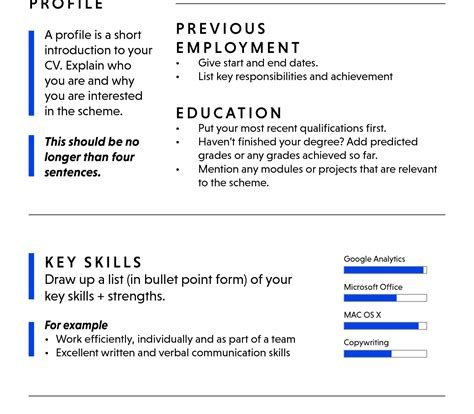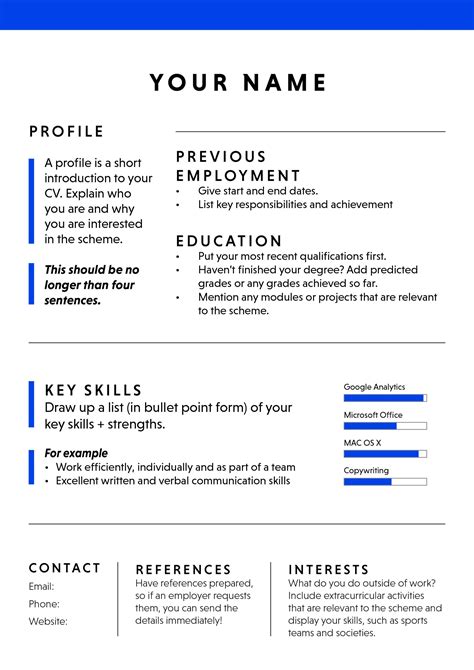

Learn how to write a CV that stands out from the crowd and showcases your skills and experience. Get expert tips and templates to make the process easy.
As a job seeker, your CV serves as your first impression to potential employers. It is crucial to ensure that your CV stands out amongst the sea of applications. However, crafting a compelling CV can be a daunting task. Where do you start? What information should you include? How do you structure it? Fear not, we’ve got you covered with some tips and tricks to help you create a winning CV!
Firstly, let’s talk about the importance of tailoring your CV to the job you’re applying for. Generic CVs tend to get lost in the crowd, whereas a targeted CV shows that you’ve put in the effort to match your skills and experiences to the requirements of the job. Secondly, the layout of your CV is just as important as the content. A well-structured CV not only looks professional but also makes it easier for the employer to navigate through your information. Lastly, don’t forget to highlight your achievements and quantify your successes. Use concrete numbers and statistics to demonstrate your impact and value.
So, whether you’re a recent graduate or a seasoned professional, follow these tips to create a CV that catches the eye of potential employers and lands you the job of your dreams!
Daftar Isi
How to Write a CV without a Title
Introduction
Writing a CV can be a challenging task, especially when you don’t have a specific job title in mind. However, it is essential to have a well-written CV as it is your first point of contact with a potential employer. A CV without a title may seem daunting, but it is not impossible. In this article, we will guide you through the process of writing a CV without a title.
Personal Information
The first section of your CV should include your personal information. This includes your full name, address, phone number, and email. Make sure that this information is up-to-date and accurate. You can also add your LinkedIn profile link if you have one.
Profile Summary
The next section of your CV should be a profile summary. This is where you can showcase your skills, experience, and achievements. It is essential to tailor this section to the job you are applying for. Highlight your strengths and how they can benefit the company.
Education
In this section, list your educational qualifications. Start with the most recent qualification first and include the institution’s name, the degree or qualification obtained, and the date of graduation. If you have any relevant coursework or training, include this as well.
Work Experience
The work experience section is where you can showcase your professional experience. Start with your most recent job and work backward. Include the name of the company, your job title, and the dates of employment. Also, include your responsibilities, achievements, and skills gained in each role.
Skills
In this section, list your key skills. These can be hard skills, such as proficiency in a particular software, or soft skills, such as communication and leadership. Tailor these skills to the job you are applying for.
Volunteering and Extracurricular Activities
If you have any volunteering or extracurricular activities that are relevant to the job you are applying for, include them in this section. This can demonstrate your commitment to the industry and your ability to work well in a team.
Awards and Achievements
If you have received any awards or recognition for your work, include them in this section. This can help to showcase your accomplishments and demonstrate your dedication to your career.
References
Finally, include a reference section. This can be a list of two or three people who can vouch for your skills and experience. Make sure to ask their permission before including their names and contact information.
Conclusion
Writing a CV without a title may seem daunting, but it is not impossible. By following these guidelines, you can create a well-written CV that showcases your skills and experience. Remember to tailor your CV to the job you are applying for and highlight your strengths and achievements. Good luck with your job search!
How to Write an Impressive CV without a Title: A Comprehensive Guide for Job Seekers
Creating a resume can be a daunting task, especially if you don’t have a proper job title to showcase. However, crafting a compelling CV is all about highlighting your skills, experience, and accomplishments, irrespective of the job title.To help you create an impeccable CV without a title, we’ve compiled a comprehensive guide that covers all the key aspects of crafting a successful resume. Here are ten subheadings to guide you through the process.
1. Start with a Strong Profile Summary
Instead of a job title, use your profile summary to introduce yourself and highlight your core competencies. This section should briefly summarize your professional achievements, skills, and objectives.
2. List Your Key Skills
Identify key skills relevant to the job and showcase them at the top of your CV. This not only draws the recruiter’s attention, but it also helps to emphasize your strengths and suitability for the job role.
3. Highlight Your Achievements
Instead of simply listing your job responsibilities, emphasize your tangible achievements. This can include awards, recognitions, promotions, or any significant milestones in your career.
4. Focus on Your Education
If you don’t have a strong job title, make up for it by highlighting your academic achievements. List your degrees, certifications, and relevant courses – and customize it according to the job role.
5. Emphasize Your Relevant Experience
When listing your work experience, focus only on the relevant roles and responsibilities that showcase your skills and achievements. Quantify your results, accomplishments, and use industry-specific keywords.
6. Showcase Your Soft Skills
Soft skills play an essential role in a job, so highlight your interpersonal skills, communication, leadership qualities, and teamwork experience. This can showcase your broad range of capabilities and contribute to your overall application.
7. Customize Your Resume
Customize your resume to match the job requirements and use keywords specific to the job role. This helps to match your skills and experience with the job description and make your CV stand out from the competition.
8. Keep It Simple and Concise
Keep your resume clean, concise, and error-free. Avoid lengthy explanations and irrelevant details, and focus on presenting your qualifications and experience clearly, demonstrating how you’ll contribute to the company.
9. Use Action Words
Using action words such as ‘created,’ ‘improved,’ ‘initiated,’ showcases your achievements and responsibilities by describing them in an engaging and active way. Showing the impact of your actions can positively influence and impress the reader.
10. Get Feedback
Finally, get feedback from industry professionals, friends, or family members. Since they will have a different perspective, this feedback can give you new insights into the clarity and effectiveness of your CV and make you stand out from other job applicants. In conclusion, crafting an impressive CV without a title is all about showcasing your strengths, experience, and transferable skills. By following these tips, you can delineate your qualifications and experience and market them effectively to potential employers.As a journalist, I understand the importance of presenting oneself in the best possible way. A well-written CV is an essential tool that can make or break your chances of landing a job. However, there are pros and cons to writing a CV.Pros:1. A CV can showcase your skills, experience, and accomplishments in a concise and organized manner.2. It allows you to tailor your application to the specific job you’re applying for.3. A well-written CV can make a good first impression and set you apart from other applicants.Cons:1. Writing a CV can be time-consuming, especially if you’re starting from scratch.2. If not written well, a CV can actually work against you and hurt your chances of landing a job.3. Some employers may prefer a more creative approach to applications, such as a video or social media profile.When writing a CV, it’s important to keep in mind the needs of the employer and the job requirements. Use clear and concise language, highlight relevant experience and skills, and tailor your application to the specific job. Remember, a well-written CV can be the key to unlocking your dream job.
The process of writing a CV is often intimidating, but it doesn’t have to be. One common question that job seekers ask is whether to include a title on their CV. The truth is that there is no right or wrong answer. In fact, omitting a title from your CV may actually be a smart move in certain situations. Here’s what you need to know about writing a CV without a title.
First and foremost, it’s important to understand that the purpose of a CV is to showcase your skills, experience, and qualifications. While a job title can give potential employers an idea of what you’ve done in the past, it doesn’t necessarily tell them anything about your abilities. Therefore, if you’re applying for a job in a different field or with different responsibilities than what you’ve done in the past, omitting a title can prevent potential employers from making assumptions about your skills.
Another reason to consider leaving a title off your CV is to avoid pigeonholing yourself. If you’ve held a specific title for a long time, it may be difficult for potential employers to see you as anything other than what you’ve been doing. By leaving off a title, you allow yourself more flexibility to present your skills and experience in a way that is relevant to the job you’re applying for.
In conclusion, while including a job title on your CV may seem like a no-brainer, it’s important to remember that there are situations where omitting one can be a strategic move. Ultimately, the most important thing is to focus on showcasing your skills and experience in a way that is relevant to the job you’re applying for. So, don’t be afraid to experiment with different formats and structures until you find one that works best for you.
Video write a cv
Visit VideoAs a journalist, I understand the importance of crafting a strong and effective CV. Many people are curious about how to write a CV that will impress potential employers. Here are some common questions people also ask about writing a CV, along with some helpful answers:1. What should I include in my CV?Your CV should include your personal and contact information, education and qualifications, work experience, skills, achievements, and any relevant volunteering or extracurricular activities.2. How long should my CV be?Generally, a CV should be no longer than two pages. However, it’s important to prioritize the most important information and not sacrifice clarity and readability for the sake of brevity.3. Should I include a personal statement or objective?Yes, a personal statement or objective can help to highlight your career goals and show potential employers what you bring to the table. Keep it concise and tailored to the specific job you’re applying for.4. How do I tailor my CV to the job I’m applying for?Read the job description carefully and make sure to highlight your relevant skills and experience. Use keywords from the job posting and customize your personal statement or objective to match the company’s values and mission.5. Should I include references on my CV?It’s not necessary to include references on your CV, but you should have them ready to provide upon request. Instead, use the space on your CV to showcase your skills and achievements.By following these tips, you can create a strong and effective CV that will help you stand out to potential employers. Remember to keep it concise, tailored, and focused on showcasing your strengths and accomplishments.






